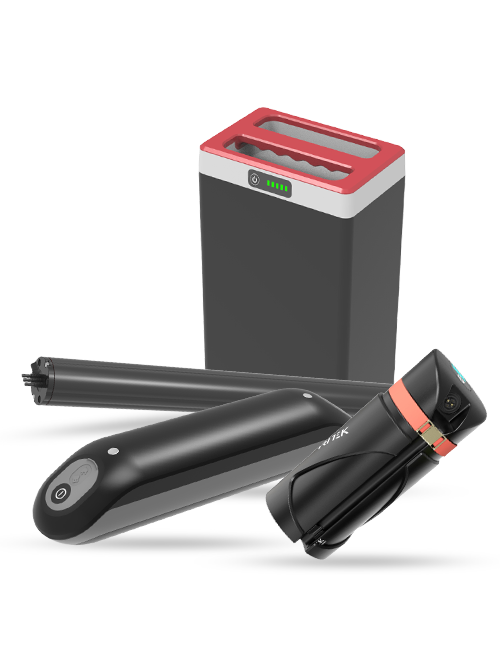One of the emerging trends in modern transportation and leisure is the growing popularity of electric bicycles, commonly referred to as e-bikes.
According to a report by Navigant Research, global e-bike sales are expected to reach 40 million units by 2023. This represents a compound annual growth rate of 6.9% from 2016 to 2023. According to the report, e-bikes are gaining momentum as a viable mode of transportation because they are budget-friendly, convenient, and environmentally sustainable.
As the demand for electric bikes rises, so does the need for reliable and high-quality batteries to power them. Bulk purchasing of lithium-ion batteries for electric bicycles has become a popular option for those looking to outfit their fleet of an e-bike with reliable and efficient batteries.
In this blog article, we will explore the issues to consider when buying e-bike batteries in bulk, and what to look for in quality e-bike battery packs.

What to look for in an e-bike battery
When purchasing an e-bike battery, it’s important to consider its capacity, chemistry, energy density, maximum and continuous watts, amp-hours, voltage class, battery management system, and high-quality cells and battery packs.
Battery life and lifespan should also be taken into account. These factors will determine the battery’s overall performance and durability.
- Capacity:
The battery capacity of an e-bike battery refers to the amount of energy it can store. The higher the capacity, the longer the battery will last before needing to be recharged. Capacity is measured in watt-hours (Wh), and a higher number means more energy storage.
Click to know How to Choose the Right Battery Capacity for Improved E-Bike Performance
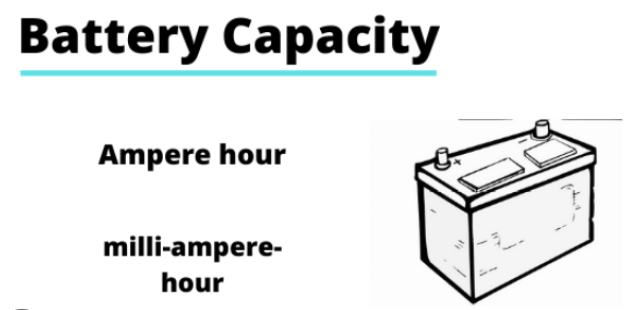
- Chemistry:
Lithium-ion batteries are the most commonly used type of e-bike battery due to their high energy density and longer lifespan compared to other battery chemistries, such as lead-acid batteries or nickel-metal hydride batteries (Ni-MH). Lithium-ion batteries are also more lightweight, making them a popular choice for e-bikes.
Read more about Which battery is best for an electric bicycle
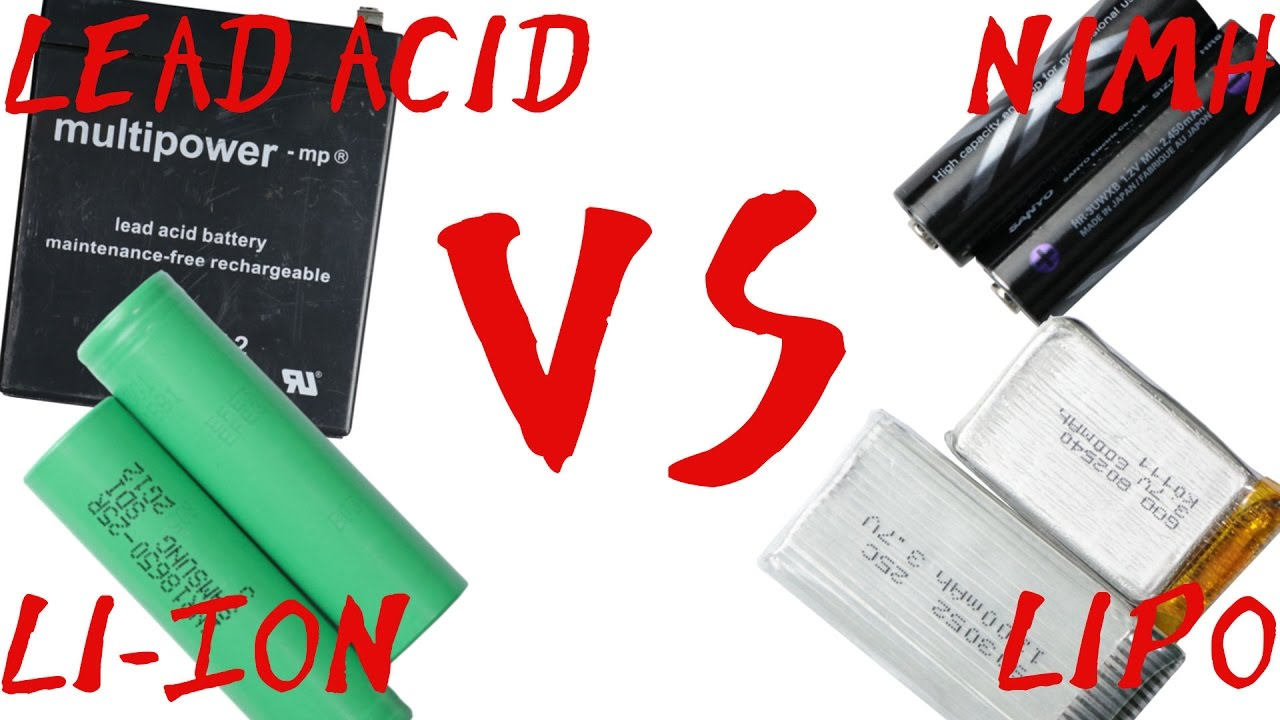
- Energy density:
Energy density refers to the amount of energy stored per unit of weight or volume. A higher energy density means more energy can be stored in a smaller and lighter battery. Lithium-ion batteries have a higher energy density compared to other battery types.
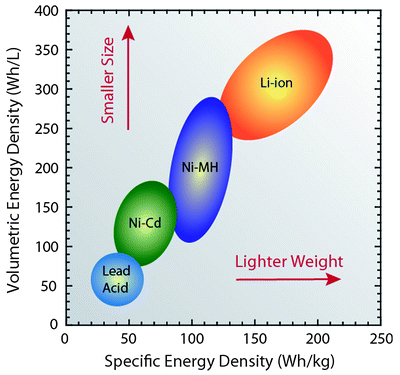
- Maximum and continuous watts:
The maximum and continuous watts refer to the amount of power the battery can output. The maximum watts indicate the highest amount of power the battery can deliver at once, while the continuous watts indicate the sustained power output over a longer period time.
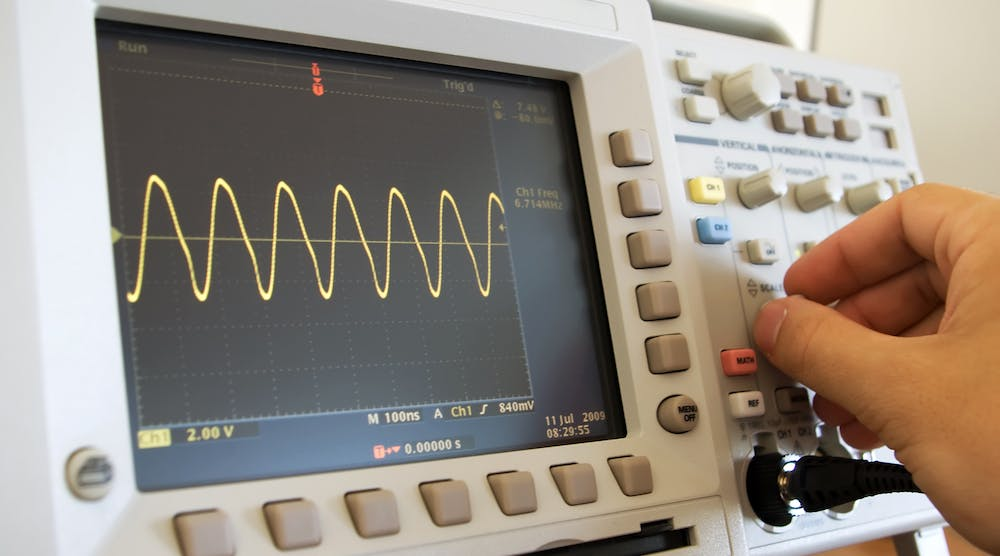
- Amp-hours:
Amp-hours (Ah) measure the amount of current the battery can provide over an hour. The higher the amp-hours, the longer the battery will last before needing to be recharged.

- Voltage class:
The voltage class of an e-bike battery determines the maximum voltage it can handle. A higher voltage class means the battery can handle more power output.
Learn more —> How Battery Voltage Affects E-Bike’s Performance
How to Choose the Right Voltage for Electric Motorcycle Batteries
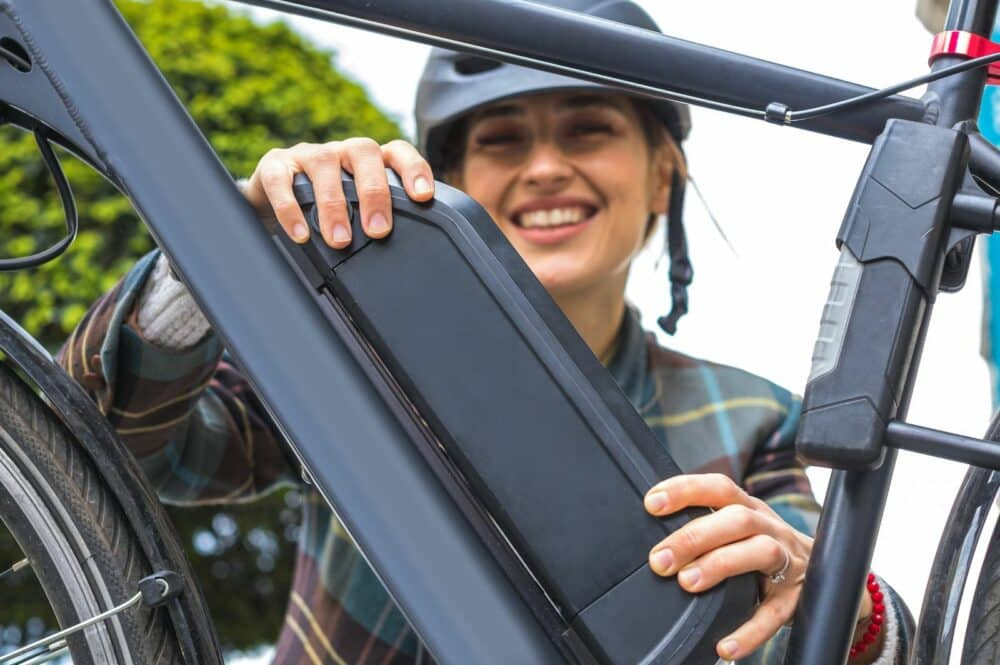
- Battery management system:
A battery management system (BMS) is an essential component of an e-bike battery that monitors its charge level, temperature, and voltage, ensuring the battery operates safely and efficiently.
Learn more about 5 Benefits of BMS battery for E-Bikes
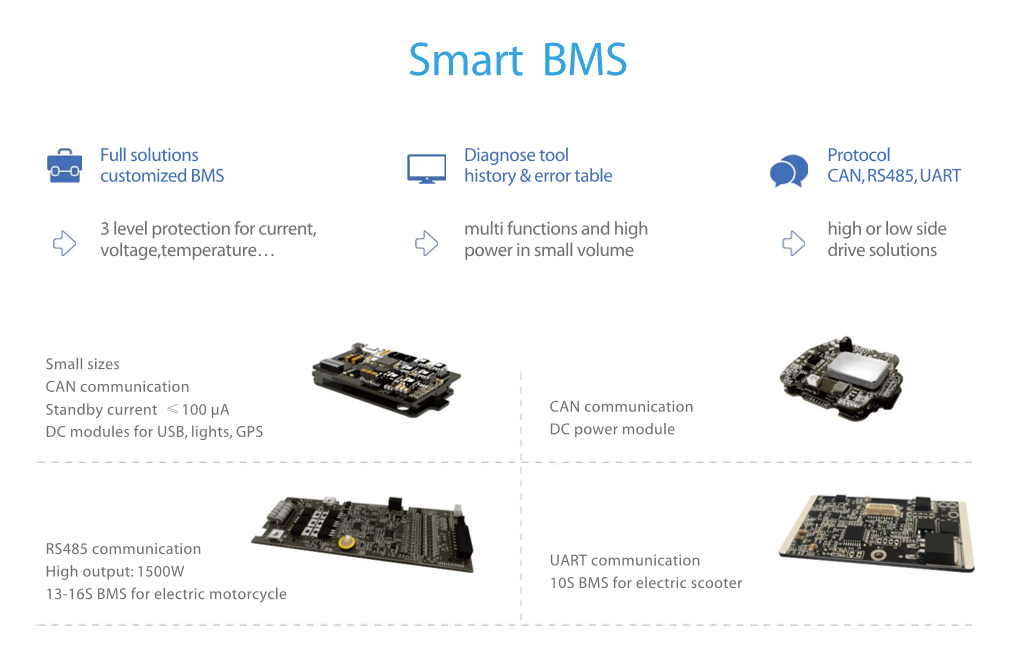
- High-quality battery cells and battery packs:
High-quality battery cells and battery packs are essential for reliable and long-lasting e-bike batteries. Cheap batteries may use lower-quality battery cells, leading to a shorter lifespan and potential safety issues.
Interest in Which 18650 battery is best for an e-bike? or Which 21700 battery is best for an e-bike?
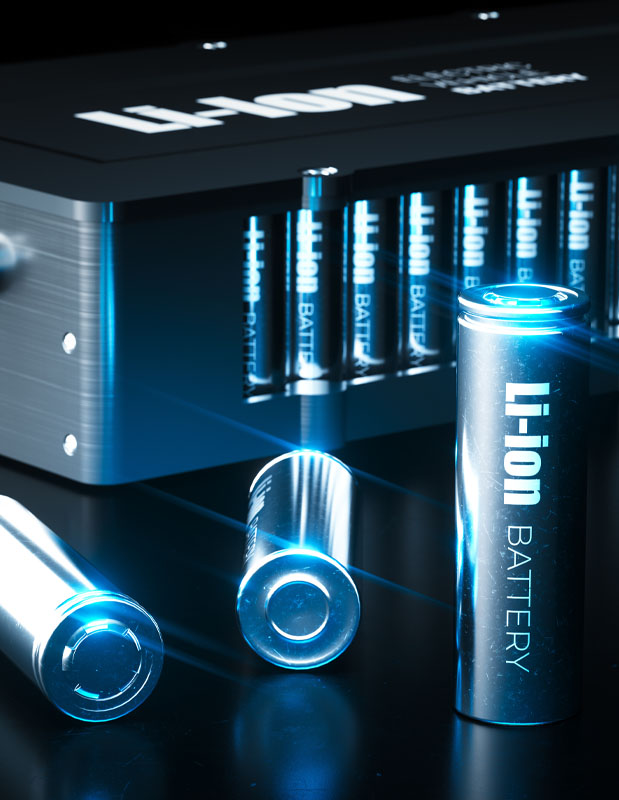
- Battery life and lifespan:
The battery life refers to the amount of time the battery will last before needing to be recharged, while the lifespan refers to the overall durability and longevity of the battery. A high-quality e-bike battery can last for several years with proper maintenance and care.
Lithium Battery Lifespan: How Many Charging Cycles Can You Expect?

By considering these factors, you can choose the right e-bike battery that meets your needs and ensures safe and reliable operation.
Why e-bike batteries fail
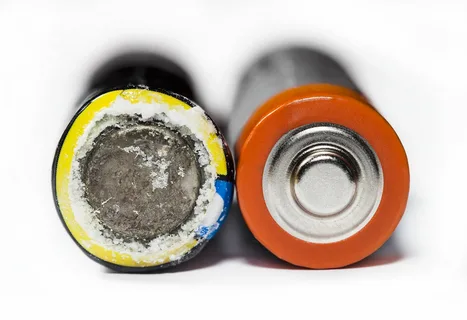
E-bike batteries can fail due to battery fires, poor quality or cheap batteries, overcharging or overheating, cycling and charging habits, environmental factors, and the weakest cell and battery pack balance. Understanding why batteries fail can help you make informed decisions when choosing a high-quality and safe battery for your e-bike.
- Battery Fires:
Lithium-ion batteries used in e-bikes can catch fire if not handled properly. This can happen due to overcharging, overheating, or a manufacturing defect.

- Poor Quality or Cheap Batteries:
Low-quality batteries are prone to failure due to their inferior construction and lack of proper safety features.

- Overcharging or Overheating:
Overcharging or overheating the battery can cause it to fail, which is why it’s essential to use a high-quality battery charger and to avoid exposing the battery to extreme temperatures.
Tritek’s 3 Stage Battery Charger for Lithium Battery
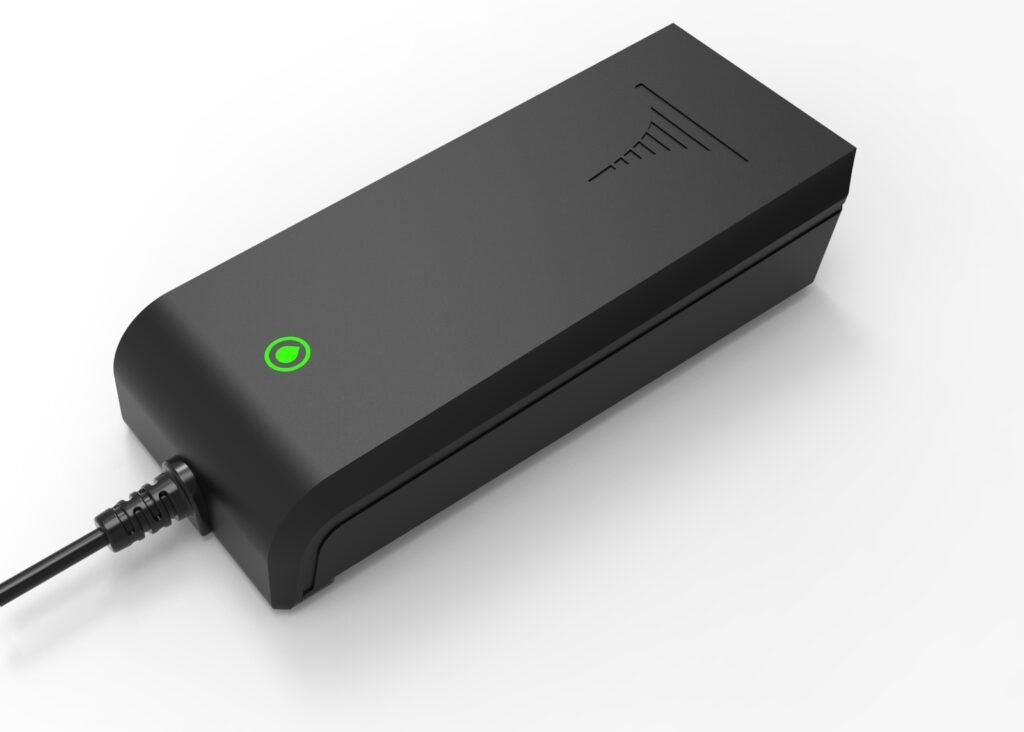
- Cycling and Charging Habits:
The way you cycle and charge your battery can also affect its lifespan. Charging the battery to 100% or discharging it completely can reduce its overall lifespan.

- Environmental Factors:
Exposure to extreme temperatures, humidity, or water can damage the battery and cause it to fail.
Do you want to know how to winter-proof your Electric Bike and Safeguarding Against E-bike Battery Overheating Risks? Click to learn!

- Weakest Cell and Battery Pack Balance:
The weakest cell in a battery pack can also cause the battery to fail, which is why it’s crucial to choose a battery with a good balance between all its cells.
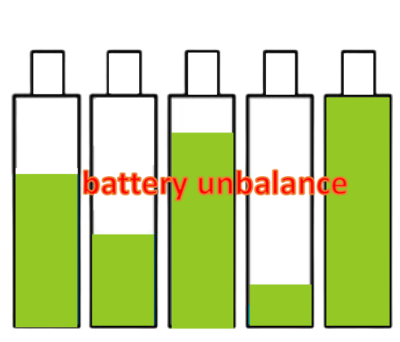
By understanding these factors, you can make informed decisions when choosing a high-quality and safe battery for your e-bike. It’s essential to invest in a high-quality battery from a reputable manufacturer and to follow the manufacturer’s instructions for charging and maintaining the battery to ensure it lasts as long as possible.
Are lithium-ion batteries in e-bikes safe?
Lithium-ion battery fires have made headlines in recent years, raising concerns about their safety. However, with advancements in battery technology and safety features, lithium-ion batteries have become safer and more reliable than ever before. The Consumer Product Safety Commission has set safety standards for e-bike batteries, and e-bike manufacturers are continuously improving safety features to minimize the risk of battery fires.

Which lithium battery is best for your bicycle?
When it comes to choosing the best battery for your electric bike, there are several factors to consider, including the battery’s chemistry and types, the pros and cons of different e-bike batteries, and factors to consider when choosing the best battery for your electric bike.
Understanding these factors can help you make an informed decision and choose the best battery for your e-bike.
- Chemistry:
There are several types of lithium batteries, including Lithium-ion (Li-ion), Lithium Polymer (LiPo), and Lithium Iron Phosphate (LiFePO4). Each has its advantages and disadvantages in terms of energy density, weight, cost, and safety.
- Capacity:
The battery capacity, measured in watt-hours (Wh), is an important factor to consider. A higher-capacity battery will have a longer range but will also be heavier and more expensive.
- Voltage:
The voltage class of the battery affects its performance, with higher voltage batteries providing more power output. However, higher-voltage batteries may also require special controllers and motors.
- Amp-hours:
The amp-hours (Ah) of the battery determine its overall energy storage capacity. Higher Ah batteries will have a longer range but will also be heavier and more expensive.
- Battery pack:
The quality and type of battery pack can affect the overall performance and safety of the battery. High-quality battery packs made with good battery management systems (BMS) can provide a longer lifespan and more stable performance.
Explore Tritek’s high-quality, light weight, high energy output battery pack.
- Energy density:
Higher energy density batteries can provide more energy storage in a smaller package, making them lighter and more compact. However, higher energy density batteries may also have safety risks.
- Price:
Lithium batteries for e-bikes can vary in price, with cheaper options often sacrificing quality and safety. It’s important to balance cost with performance and safety when choosing a battery for your electric bike.
Ultimately, the best lithium battery for your e-bike will depend on your specific needs and preferences, including your budget, range requirements, and desired performance.
It’s important to do your research and choose a reputable manufacturer with a track record of producing high-quality e-bike batteries.
How long do e-bike batteries last?

One of the most important factors to consider when purchasing an e-bike battery is its lifespan.
The lifespan of a battery is affected by various factors, including charging and discharging habits, storage and environmental factors, routine maintenance and inspections, and the type of battery being used.
Here are some of the factors that can affect the lifespan of your e-bike battery:
- Charging and Discharging Habits:
One of the most important factors affecting the lifespan of your e-bike battery is how you charge and discharge it. Overcharging, undercharging, or deep discharging your battery can all reduce its lifespan. To extend the life of your battery, it’s important to use the right charger and charge your battery only when needed. You should also avoid fully discharging your battery, as this can cause irreversible damage.
- Storage and Environmental Factors:
The way you store and use your e-bike battery can also affect its lifespan. Extreme temperatures, moisture, and exposure to sunlight can all damage your battery. To extend the life of your battery, store it in a cool, dry place and avoid exposing it to direct sunlight or extreme temperatures.
- Routine Maintenance and Inspections:
Regular maintenance and inspections can help you identify and address issues with your e-bike battery before they become serious. You should regularly check your battery’s voltage, capacity, and overall condition to ensure that it is functioning properly.
- Type of Battery:
The type of battery you choose can also affect its lifespan. Lithium-ion batteries are typically more durable and have a longer lifespan than lead-acid batteries. Lithium iron phosphate (LiFePO4) batteries are even more durable and can last up to 10 years with proper care and maintenance.
On average, e-bike batteries last between 3 to 5 years. However, with proper care and maintenance, some batteries can last up to 10 years.
To extend the life of your battery, it’s important to follow the manufacturer’s recommendations for charging and storage, as well as perform routine maintenance and inspections.
Additionally, investing in a high-quality battery from a reputable manufacturer can help ensure that your e-bike battery lasts as long as possible.
Comprehensive guide: Lithium Battery Lifespan: How Many Charging Cycles Can You Expect?
Frequently Asked Questions
- Can an e-bike battery last 10 years?
On average, e-bike batteries last between 3 to 5 years, but with proper care and maintenance, some batteries can last up to 10 years. However, this largely depends on factors such as the battery’s chemistry, quality, usage habits, and storage conditions.
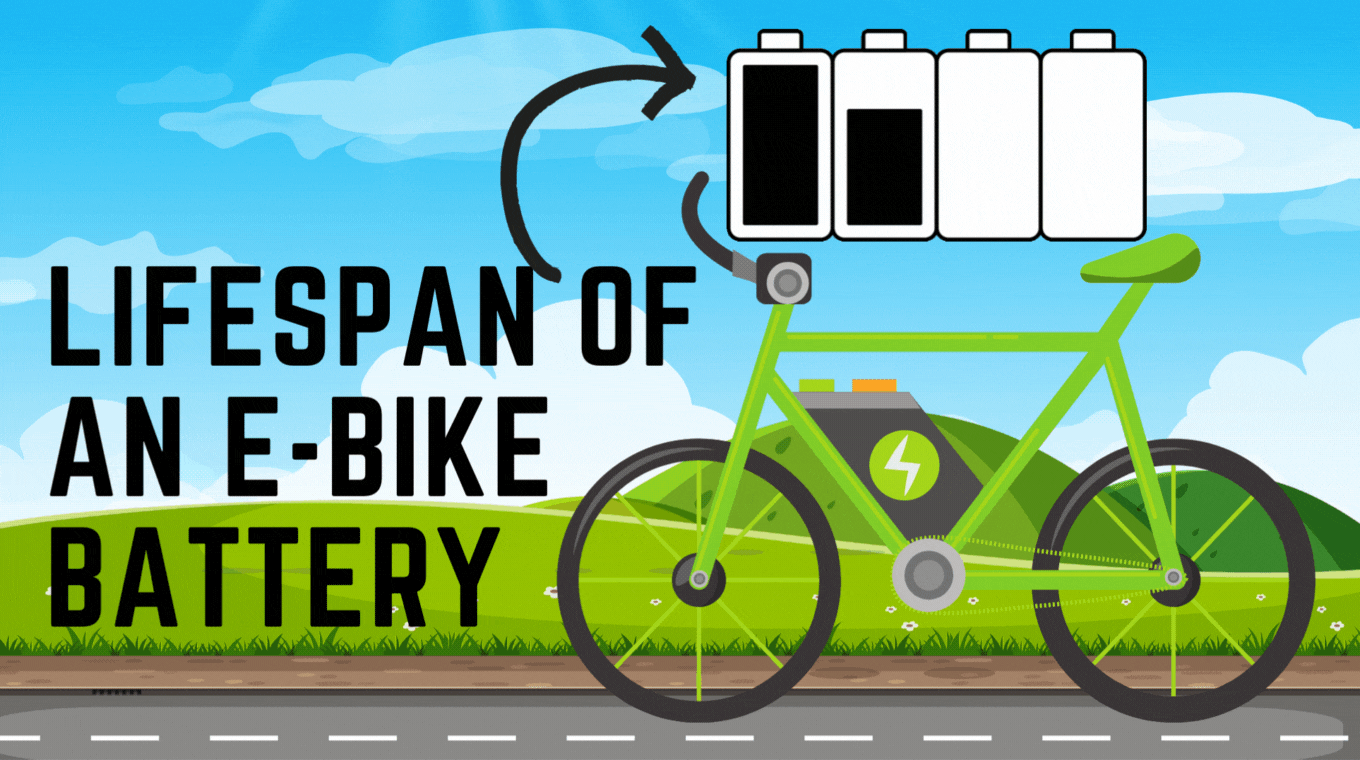
- Is it okay to leave an e-bike battery plugged in?
It’s generally not recommended to leave an e-bike battery plugged in for an extended period of time, as this can lead to overcharging and overheating, which can damage the battery and potentially cause a fire. It’s best to unplug the battery once it’s fully charged and store it in a cool, dry place.
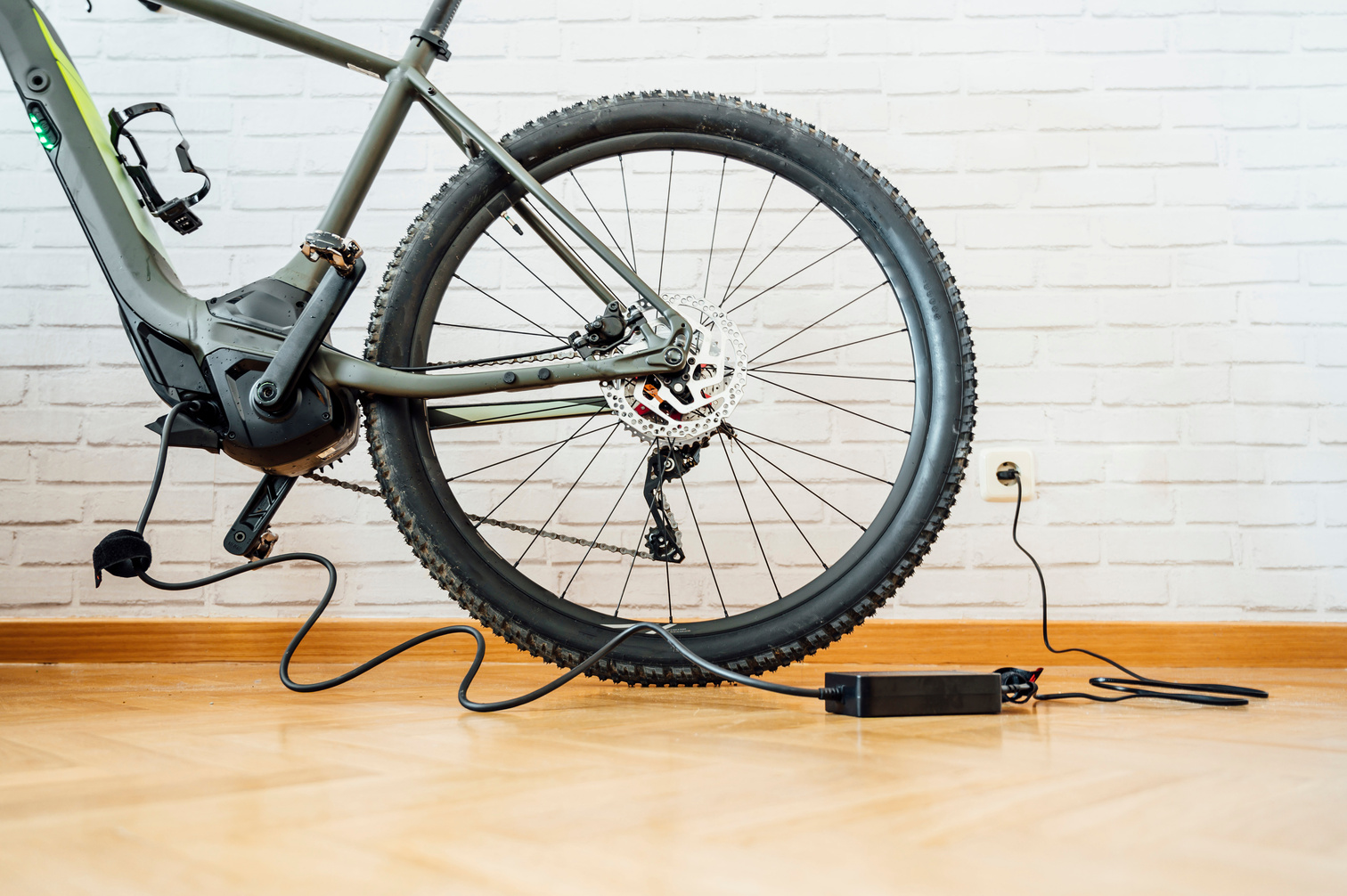
- How do you know if your e-bike battery is bad?
Signs that your e-bike battery may be bad include a reduced range or shorter battery life, slower performance, inconsistent charging, and a swollen or bloated appearance. If you notice any of these signs, it may be time to replace your battery.
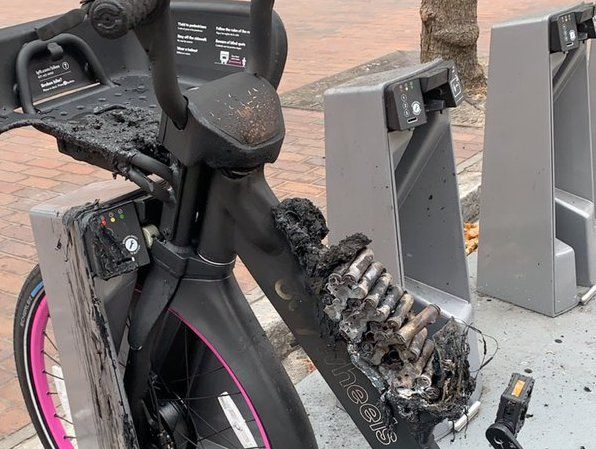
- Will a higher voltage battery make my e-bike faster?
Not necessarily. While a higher voltage battery can provide more power to the motor, the speed of the e-bike is also affected by other factors such as the motor’s wattage, the size of the wheels, and the weight of the rider and bike.

Conclusion
Choosing the right e-bike battery is essential for a satisfactory electric bike experience.
By considering the factors discussed in this article, you can make an informed decision when purchasing a high-quality and safe battery for your electric bike. With proper care and maintenance, your e-bike battery can last for years, providing reliable and efficient power for your electric bike.
Tritek is a reliable lithium battery manufacturer that produces high-quality lithium batteries for a range of applications, including electric bikes, electric motorcycles, electric scooters, cargo bikes, and custom e-bike battery. Our lithium battery products cover a wide range of types and capacities to meet the needs of different customers, and we provide personalized battery solutions according to customer’s actual needs. With a strong focus on product quality and R&D capabilities, Tritek has a strictly managed quality system and a committed R&D team to ensure the production of high-quality batteries.
One of the key features of Tritek’s batteries is our integration with intelligent Battery Management Systems (BMS) to ensure the safety and stability of the batteries during use.
With our strong production capacity, Tritek can deliver a large number of batteries quickly to meet our customers’ needs.
We also provide 0km after-sales service during the sales process to ensure our customers receive timely support and maintenance during use.
With Tritek’s commitment to producing high-quality batteries and providing excellent customer service, Tritek has become a trusted choice for those seeking a reliable lithium batteries manufacturer.


